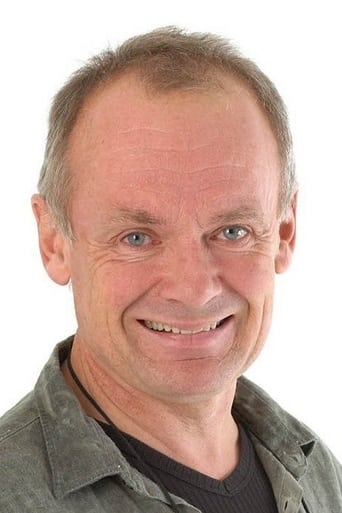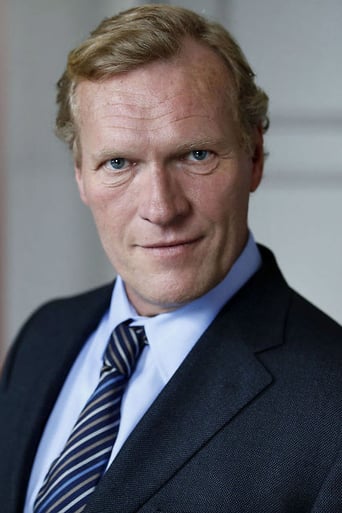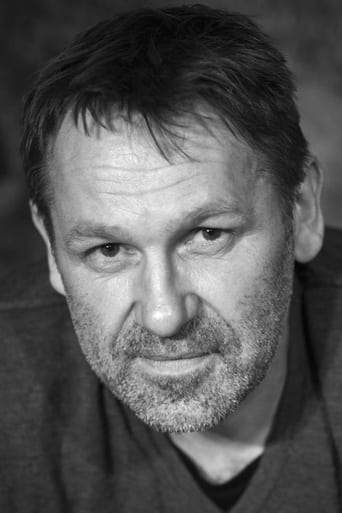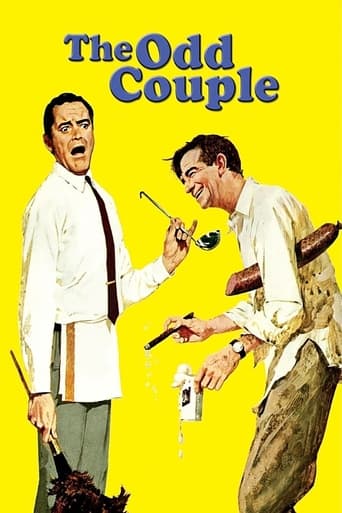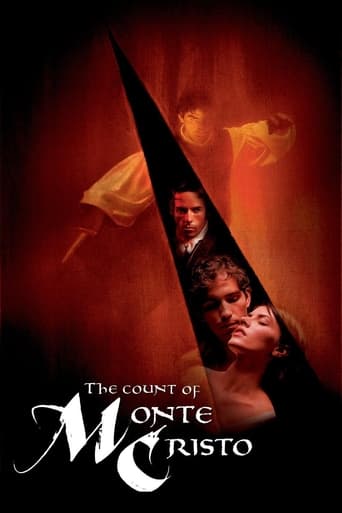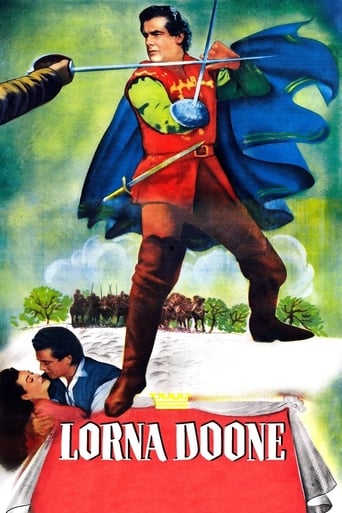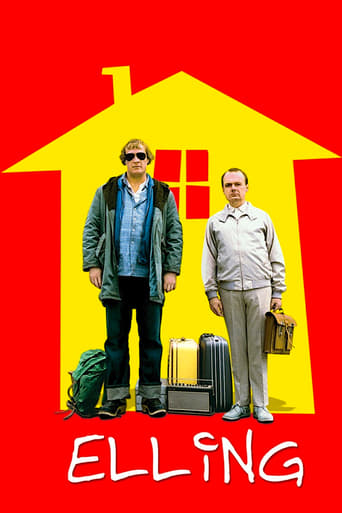
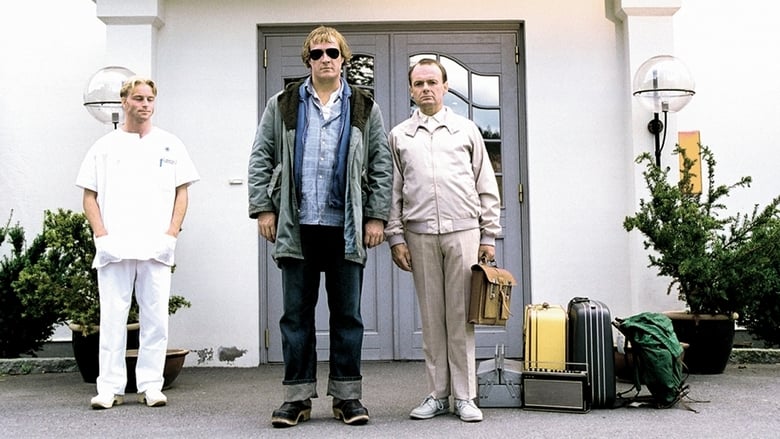
Elling (2001)
40-year-old Elling, sensitive, would-be poet, is sent to live in a state institution when his mother, who has sheltered him his entire life, dies. There he meets Kjell Bjarne, a gentle giant and female-obsessed virgin, also in his 40s.
Watch Trailer
Cast


Similar titles
Reviews
Inspired by Lars von Trier's "The Idiots" to come up with a kinder, gentler film and a chance for Gerard Depardieu's stunt double to get a starring role.....um.....no.I actually thought the earlier review and "The Odd Couple" reference is pretty spot on. And as that spawned a TV show, apparently this comes as part of a trilogy. That kind of surprised me.The film will not surprise so much, but if you let yourself not worry about the diabetes of your soul and enjoy the treacle, it works just fine. I watched the first maybe 2/3 the night before, and for whatever reason was thinking more about adults in such situations, woke up and then accepting these dramatic devices to portray some simple cinematypes (uptight outcast who must accept himself and others pitted next to the heart-of-gold headless hoss-hunk) and sure you root for them knowing that, unlike in life, their happiness is guaranteed, and they will find a way in the world.I did enjoy the professor/poet introduction much more than the hoss-hunk's heroine.And the message that pretty much all people feel like outcasts who don't fit in, but plenty of us (well maybe not me, so plenty of you) find a way somehow is reassuring.
A simple film of simple people with simple intentions, Elling (2001), a Petter Naess film, portrays a pair finding their way through the welfare state of Norway. An authentic focus on the lives of these two men with mental illness grabs sympathy from the audience as they watch the everyday struggles of Elling (Per Christian Ellefsen) and Kjell Bjarne (Sven Nordin). After living the majority of his life with his mother, her unexpected death cripples Elling and his psyche, and we see Elling being forced out of a closet he had been hiding in by the Norway welfare people for his own good will. Elling meets his roommate, Kjell Bjarne who obsesses over the sexy stories Elling tells him. Eventually, the pair find themselves living in a big city welfare apartment provided for them by the Norwegian government. It is here that they build a relationship with their social worker, Frank Asli (Jorgen Langhelle) as they try living day to day life.The topic of mental illness is central to this film, as the two main characters had the Norwegian government intervene in their lives because they were unsuitable to live on their own. Naess chooses to not include the actual diagnoses of each character because he felt that including a clinical diagnosis for each character would dehumanize them. This choice is extremely effective in translating a very likable nature behind the pair no matter their psychological differences. Although, Naess had good intentions of making the two very likable in spite of their mental illness, it also may translate to the audience that all people with mental illness are such simple, good natured, likable people that must be taken care of by their respective state governments. Nonetheless, the simplicity of these two characters definitely grab at the audiences' heartstrings.The character of Elling is a staunch Labour Party supporter and Gro Harlem Brundtland enthusiast which is a major theme throughout the film. Once the unlikely pair move into their government housing, Elling insists on putting an almost angelic photograph of Gro Harlem Brundtland (a major supporter of the welfare state in Norway) in a prominent spot on their dining area wall. Elling has idealized Gro Harlem Brundtland so much that he constantly reads about her and almost substitutes her for his mother and for those who are taking care of him. Such strong support by Elling for this Party can be seen in political disagreements that he has with his new friends at a cabin where he truly believes everything the Labour Party has done is right and true. The viewer may question if Elling clung to this idealism once he could no longer cling to his mother What seems to draw Elling out of his neurotic rut is the opportunity for new friendship and even family. Kjell Bjarne, no matter how different he is in personality, and Elling demonstrate their friendship when giving each other gifts on Christmas. They both pick something that is truly perfectly inherent to the others personality and this moment is one of the most meaningful and precious of the entire movie, granted Kjell's present was a nude woman on a watch! Elling and Kjell Bjarne provide each other with exactly what each other needs to balance out, which seems to be why the pair is so successful in living on their own and really creating their own family.For such a simple pair of characters, Naess provides a simple amount of locations for scenes. A large amount of the film takes place in the government provided housing that Elling is afraid to leave. Once Elling begins to shed some of his anxieties, we see both Elling and Kjell Bjarne in different places with different people such as a poetry house, cabin, or friends' apartment. Simple cinematic techniques are used as well to compliment the simple characters. The use of voice-over provides extra detail if needed that may not be interpreted from a scene. Besides this technique, there seems to be no flashy devices like those in Hollywood that catch a viewers' attention. But rather, the viewer is able to focus on the characters and their likability and simplistic nature.The film, Elling (2001), is an uplifting story with authentic characters that develop through being forced into the "real world" essentially. There are no hidden things to get from this film, as it is upfront and simple and only wants to provide the story of an unlikely pair coming together to form their own family.
"Elling" is a film with the potential to resonate in a variety of audiences, with people from all over the world, from various cultural, social, and economic backgrounds. It deals with universal issues that are not restricted to Oslo, Norway, or anywhere else in the world for that matter. Director Peter Næss does an excellent job of portraying common issues of anxiety, shyness, and confusion in social situations in his characters Elling and Kjell Bjarne. Elling and Kjell Bjarne can teach us a thing or two about the way we think about society and the world today, and maybe even something about ourselves.It's important to note that while both main characters are socially inexperienced, neither of them has a documented disability of any kind. All we know is that they lived extremely sheltered lives, and now that they are adults they must learn to fend for themselves as everybody else does. They're normal people, just like everyone else, they've just been sheltered and are therefore nervous about stepping out into the world outside. Everybody gets nervous in new situations. Most people don't experience it to the same extent as Elling and Kjell Bjarne, but it's something most people can relate to on some level.Society today often looks down on people who are unable to cope with certain social situations or who can't live on their own, unless they have some sort of disability. It seems that we tend to think that they are less deserving than so-called "normal" people. The film does a good job of portraying them as portraying them as "normal" people with a variety of social anxiety issues due to their sheltered lives. We are meant sympathize and relate to the characters as opposed to look down on them. The film seems to be a realistic portrayal of the welfare system in Norway, and might be very different to what an international audience is accustomed to.After living in an institution for a few years, Elling and Kjell Bjarne are given an apartment and a stipend, funded by the Norwegian government, in order to assimilate into the world outside the institution. They're trying to prove that Elling and Kjell Bjarne can live on their own and become fully functioning members of society. Their social worker, Frank Asli, can be rather harsh and demanding, but he succeeds in helping Elling and Kjell Bjarne adapt to the world outside their institution, so one could say that his methods are effective. In Norway's welfare system, everybody is given a chance to live the fullest life possible, and programs are often funded by the state in order to provide equal opportunities.It's important to note that the institution placed Elling and Kjell Bjarne in an apartment together, so that they can help each other with their issues. They each have their own strengths and can help each other with different things. At first, Kjell Bjarne is more comfortable going out in public, so he does the shopping and eventually gets Elling to accompany him to the café for pork and gravy. Elling struggles with going out in public until he finds something that he can do for himself, when he decides to go to a "poetry meeting". He wants to prove to Kjell Bjarne that he can do things on his own too. Elling wants to be the more responsible, sophisticated one. They set examples for each other to follow, and each one wants to be able to do what the other one can, so they essentially end up teaching and learning together about their new world in Oslo."Elling" is a film that almost everyone can relate to. Almost everybody gets nervous in certain situations, whether it's public speaking, flying, going on a ship, or just going to the grocery store. Because Elling and Kjell Bjarne have no documented ability, it's easier for the audience to relate to the characters and to see a little bit of the characters in themselves. It's easy for the audience to laugh along with the characters as they adventure in their new world. It can also provoke thoughts about the way that society deals with people like Elling and Kjell Bjarne, how people view them on the street, and how the government treats them. In the film, they receive support from the government, and reactions to the welfare system in Norway can vary depending on where a viewer is from. Perhaps one of the most important aspects of the film, however, is the importance of working together as a team. Elling and Kjell Bjarne are in this situation together, and they eventually are able to overcome their differences to work together and begin to find their place in the world.
Elling, a gentle Norwegian comedy by Petter Næss, was one of my favorite Norwegian films. Nominated for an Academy Award for the best foreign movie-which was well deserved-observes the day-to-day rehab of two middle-aged men upon their release from the local mental hospital. They were roommates at the hospital, and the film follows them as they continue to be roommates n their assigned state-sponsored apartment in Oslo. The "couple" is forced to overcome their compulsions and phobias in order to learn and navigate in the real world in the most simplistic ways. As far as themes go, this is a very Nordic film. Petter brilliantly probes into mental illness, the welfare system, politics, and substance abuse, and family in a comical way that keeps the audience entertained, while still managing to make it mellow dramatic.One prominent theme portrayed, which is greatly contrasted to that of the States and which I was thoroughly impressed by, was the welfare system. Elling, a prudish momma's boy scared to even cross the street played by Per Ellefsen, and Kjell, an outward oaf with an obsession of women but contrasted with a gentle soul played by Sven Nordin, are well taken care remarkably well. Rather than being bombarded with prescription drugs to cope, these two are put up in comfortable living quarters –which appears to come at no cost to the two. They are visited regularly by a social worker, Frank-played by Jørgen Langhelle, who assists them in developing these everyday skills, often through tough love, and monitors their progress. One of my favorite scenes is when Frank is teaching the two, mainly Elling, how to use a phone. Elling is terrified of the phone-probably much similar to a persons fear of heights or maybe public speaking- and refuses to pick up the phone when it rings, claiming his mother always handled the phone. Petter does a good job of making it comedic in the way he portrays this, using intensifying music and a series of cuts to show the length of time it took Frank to teach Elling this simple skill.In probing into mental illness, Petter manages to avoid using any medical lingo to describe their illnesses. It is blatantly obvious that there is something wrong with these two, but Petter's reluctance to identify these issues keeps the characters human, and allows the audience to sympathize and connect more with the characters. Being a comedy, the audience is able to laugh WITH the characters rather than laugh AT them. Elling and Kjell are merely oddballs given the chance to become less sheltered and function in everyday society. And as much as Frank is there to help them, the relationship developed and support given between the two is ultimately the focal point of their progress. Elling no longer has his mother, and so Kjell has replaced her as Elling's day-to-day contact and support. The relationship developed between the two has become their new families. And their dependence on each other is apparent, especially later in the film when Kjell is moving along quicker than Elling is, and there is a scene where Elling has a mini freak-out. He has this mini freak-out for fear of loneliness and losing his "family" again.There are subtle references to politics throughout the movie. Elling is obsessed with Gro, a popular leader of the labour party. He is appalled when eating at his neighbor's, Alfons played by Per Christensen, house and Alfons' wife makes a negative comment about Gro and Elling gives her a piece of his mind. It was amusing to see how much he worshipped Gro, who along with Kjell, has somewhat replaced Elling's mother.As the two progress and begin to get their feet wet in the real world, they begin to see the real world's terrors. There is a big change in their lives when they come across a drunken neighbor, Reidun played by Marit Jacobsen, in their apartment complex, who happens to be pregnant! This scene while relatively comical and over exaggerated, gives us an insight to the role drinking plays in the Nordic lifestyle. But anyways, Reidun is essentially the catalyst to the Elling and Kjell's separation and independence. Elling becomes infatuated with his alternate ego, The Sauerkraut Poet, and frequents poetry clubs. One of my favorite Norwegian films, Petter Næss delves into Nordic themes-welfare system, mental illnesses, politic, family, and substance abuse- commonly portrayed in other Nordic films, while managing to do so in a comical manner that allows the audience to connect to the characters. His ability to gain sympathy from the audience, while also allowing them to laugh WITH the characters, rather than AT them is a major reason this movie appeals to me.


